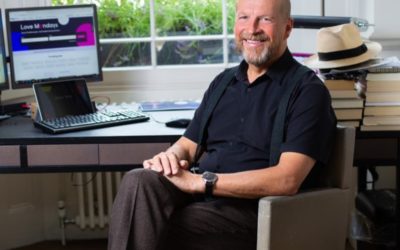Pressure on leaders right now is immense: you are expected to convey calm optimism in the midst of a global pandemic, take short-term decisions faced with a fragile economic future, juggle unprecedented business demands while remaining sensitive to employee well-being. As leaders you are in uncharted waters, yet your team is relying on you for direction, reassurance and the route to recovery.
If this sounds familiar, do not despair. Drawn from my experience and research as an Executive career coach specialising in leadership development, here are four key ‘pillars’ every leader should follow to navigate their organisation through this pandemic: Purpose, Empathy, Entrepreneurship and Excellence.
Purpose
This is not about posting hollow ideals on a company website; it’s about living and breathing your organisation’s purpose and values at every level. Nurturing purpose should be a continual task for all leaders. But if you haven’t already done so, now is the time to clearly define your purpose. It may require prioritisation and creative thinking.
Purpose-driven teams are far more successful than those purely focused on short-term profits. A sense of purpose provides people with direction and motivation. So often I have seen how a lack of purpose leads to low energy and motivation in teams, and poor talent-retention in organisations.
“It’s the purpose that creates the team – not the team. The need and the purpose is already out there in the world waiting for a team to respond”
Peter Hawkins, Professor of Leadership, Henley Business School, 2020
Now, more than ever, having a sense of purpose is vital for energising employees. Particularly since recruitment freezes and furlough schemes mean those left ‘holding the fort’ are working harder than ever. A clear purpose helps unite individuals and their organisation, connecting individual and collective values. It can also stimulate creativity and inspire people to be at their best.
Ask yourself these questions to ensure you deliver on purpose:
- Who, as a team, do we serve? (map out ALL of your stakeholders, not just the board).
- Are we integrating the contribution of every team member into our purpose?
- Does everyone understand the wider purpose and their individual role, or the project they have to execute within it?
- Is the purpose understood and committed to by all team members?
- During this period of uncertainty, ‘conscience check’ your decisions against your values as a leader and as an organisation. When the dust settles post-pandemic, how will you measure your success? Will your actions be seen as consistent with your purpose and values?
- Have you shared your plans broadly with employees to engage them on the challenges the organisation faces, including the painful decisions to be made?
Empathy
The value of empathetic leadership is widely recognised. Just to be clear, showing empathy in a crisis does not mean inaction when faced with tough decisions. It’s about making the tough decisions and communicating them honestly and compassionately. It’s about deep listening and understanding different perspectives from within your organisation. If empathy doesn’t come naturally to you, then build it into your regular interactions with your team by following these five steps:
- Ask specifically ‘how are you feeling about…’ rather than a generic ‘how are you feeling’, which generally elicits an ‘I’m fine’ response regardless.
- Create a listening culture where everyone is encouraged to speak up. It could be via a wellbeing survey or regular one-to-one chats. For some, speaking up during a video call is difficult, so have different channels open for communication.
- Understanding and listening to yourself is critical too. Self-care for leaders is paramount. Yvette Jeal has some helpful tips on managing your own resilience in her article ‘Finding resilience to weather the storm’.
- Be honest and transparent and do not over reassure. You cannot know everything. Now is the time to be confident in not knowing’, and being honest about that.
- Many organisations initiated well-being initiatives at the start of the crisis. This needs to continue as we transition to our ‘new normal’.
Many employees may be concerned about returning to the office having enjoyed working from home and its benefits (no commute, relaxed pace etc). As a leader, you will need to find a way to address these concerns by listening to employee perspectives and come up with solutions. An empathetic approach is the starting point. Listening to all your stakeholders helps to build loyalty and trust, which is essential for employee engagement.
“From my experience, people respect honesty. They want to understand and see how their work contributes to the wider team/organisation, and they want to feel appreciated for what they do. As such, strong and effective communication is critical to the success of any team or business”
Ian Nicholas, Global Managing Director, Reed Specialist Recruitment.
Entrepreneurial Mindset
Entrepreneurial thinking is a one of the key skills needed in leadership, particularly when faced with recession. In my opinion, we don’t focus enough on this within large organisations. It’s historically been more present in small and medium-sized enterprises (SME). Now, more than ever, all leaders need to be thinking like small-business owners: the survival of your organisation depends on the strength of your entrepreneurial mindset.
I recently carried out some research into employee qualities desired by leading employers. An entrepreneurial mindset was high on the wish-list.
The entrepreneurial mindset behaviour questions below can be used currently as a check-list or scorecard for measuring your own EMQ (Entrepreneurial Mindset Quotient).
Ask, as a team, are we:
- Curious, thinking differently about new possibilities and acting to explore them, constantly questioning how things can be done better?
- Open to new ideas/information/advice, developing relevant and realistic plans to ensure proper execution of goals?
- Accomplishing more with less, recognising that constraints breed resourcefulness, demonstrating self-sufficiency and invention?
- Taking calculated risks, recovering from set-backs and learning from mistakes, moving forward positively with persistence?
- Spotting opportunities within a changing business environment that could add value; are we agile to change?
- Optimistic and opportunistic in nature – demonstrating passion and conviction for new approaches/products/services or technologies?
One of the key challenges is being able to see long-term opportunity within a short-term threat. It’s a delicate balancing act of optimism and calculated risk-taking. Organisations should prepare to accelerate out of this crisis, with a year from now being a reasonable time-frame for emergence. Specifically, leaders should be asking these questions:
- What is likely to change permanently as a result of the crisis?
- What existing trends is the crisis likely to slow or accelerate?
- Do these sorts of changes create opportunities and/or threats post crisis that can be capitalised on if we rapidly and effectively pursue the right actions?
- If so, what needs to happen to lay the groundwork to do this?
Questions source: Looking for Opportunity in the Midst of Crisis – Sloan Review
Excellence in execution
Successful outcomes from the ‘pillars’ above ultimately depend on their execution. Let me explain: a leader may intend to communicate clearly to all employees, but if there is no structured communication process, then, no matter how strong the intention, it will not be achievable. Particularly in a recovery period, there needs to be excellence across all processes within an organisation – from cashflow management and remote-working to customer experience.
“Excellence is conventionally—in fact, almost without fail—seen as a long-term aspiration. We disagree. Vehemently disagree. Excellence is not a destination at which you arrive on a glorious sunny day after years of brutally hard work. Excellence is a way of life, a way of being that sustains us and inspires us and inspires those who are around us day in and day out”
Rose Gailey and Tom Peters, Heidrick and Struggles International, Excellence is the next five minutes, 2020
The greatest leaders I’ve worked with inspire a relentless pursuit of excellence in their teams, yet they also know when to adapt if their high standards are not met. As we emerge from the Covid-19 pandemic we need to encourage excellence in everyone.
Ask yourself before every action – before hitting send on a four-line email, before getting on screen for the next meeting, before responding to the next challenge: am I, or am I not, showing up with a commitment to excellence? Good luck.
Stephanie Rix is an Executive Career Coach specialising in leadership with over 15 years corporate experience. Stephanie has an MA in career development and coaching, and is a board director for the Career Development Institute. Stephanie owns ‘Life’s Work Consulting’ delivering career and leadership coaching programmes for both individuals and organisations. She has a diverse client base across various organisations and sectors. Stephanie is also an Associate of Women Returners Ltd delivering career returner programmes partnering with major organisations. She is also a regular facilitator, speaker and coach for Warwick Business school and enjoys coaching many international MBA professionals from a wide variety of sectors.
***
Sources and further reading
The toughest leadership test – McKinsey
Leading virtual teams – Deloitte
Demonstrating corporate purpose in the time of coronavirus – McKinsey
Global Team Coaching Institute Peter Hawkins – David Clutterbuck 2020
Looking for Opportunity in the Midst of Crisis – Sloan Review







